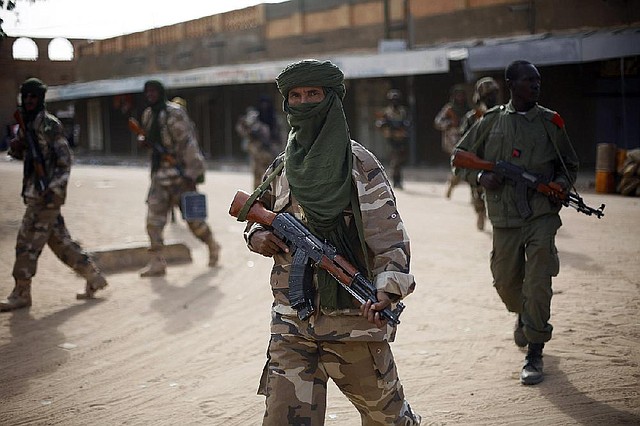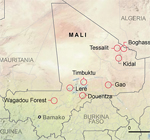Gao’s freed Malians round up extremists
Chadian soldiers patrol the streets vacated by Islamic extremists in Gao, Northern Mali, Tuesday Jan. 29, 2013, days after Malian and French military forces closed in and retook the town from Islamist rebels. Earlier Tuesday, four suspected extremists were arrested after being found by a youth militia calling themselves the "Gao Patrolmen". Malian soldiers prevented the mob from lynching them. (AP Photo/Jerome Delay)
Wednesday, January 30, 2013
GAO, Mali — Residents in Mali’s newly liberated city of Gao hunted down and beat suspected Islamist extremists who had not fled with their brothers-in-arms as Malian and French military forces closed in and retook the town.
Malian troops bundled the men into an army truck Tuesday, their hands bound behind their backs. For the better part of a year, the al-Qaida linked extremists had banned music, insisted women cover themselves and began carrying out public executions and amputations in the towns of northern Mali that they controlled.
Now the Islamists’ control of the cities has slipped, with the provincial capitals of Gao and Timbuktu coming back under government authority in quick succession with the arrival of French and Malian troops. They also may have lost control of a third key city, Kidal.
France, the former colonial ruler, began sending in troops, helicopters and warplanes on Jan. 11 to turn the tide after the armed Islamists began encroaching on the south, toward the capital. French and Malian troops seized Gao during the weekend, welcomed by joyous crowds. They took Timbuktu on Monday. The Islamists gave up both cities and retreated into the desert.
But not all of them left.
Members of a youth militia, the Gao Patrolmen, went house to house hunting down suspected Islamic extremists in Gao. Abdul Karim Samba, spokesman for the group, said men were scouring the town for remnants of the extremist Islamist group known as the Movement for Unity and Oneness of the Jihad, or MUJAO.
“They are the Islamists who have gone into their homes to hide, so we’ve been rounding them up to hand them to the military,” he said. Troops from Chad, one of the African nations sending soldiers to help restore Malian government control over the whole country, patrolled the streets, and French soldiers joined overnight patrols. The city market was slowly returning to normal.
On Tuesday, Tuareg fighters from a secular rebel group said they were now in charge of Kidal, some 170 miles to the northeast.
The National Movement for the Liberation of Azawad- Azawad is the Tuareg’s name for their homeland - appears to have taken advantage of the French-led military offensive to assert themselves in Kidal. Phone lines were down there, making it difficult to independently confirm the group’s claim. The loss of Kidal would mean the Islamists no longer control any of the northern provincial capitals that they had seized last April.
On its website, the Tuareg fighters said they are ready to work with French troops and fight terror organizations. However, the group said it would refuse to allow Malian soldiers in Kidal and the other towns under its control in northeastern Mali, after allegations that the troops killed civilians suspected of having links to the Islamists.
Timbuktu Mayor Ousmane Halle said Tuesday that he hopes to return home in the next 48 hours from the capital but that the Islamists had destroyed part of the airport’s runway before leaving, making it hard for planes to land.
Halle had a message for Iyad Ag Ghali, the leader of the extremist group Ansar Dine, which imposed strict Shariah law in Timbuktu last year and forced thousands toflee in fear.
“In one of the meetings I had with Iyad Ag Ghali, he told me that the whole world knows he is the master of Timbuktu. But today it’s me that is the mayor of Timbuktu, and he is on the run like an animal,” Halle said.
African and Western nations on Tuesday pledged more than $450 million to fund an African-led military force to continue the fight against the Islamist extremists in Mali. The promises of money and equipment were made in the Ethiopian capital, Addis Ababa, at a conference held by the African Union, which said $960 million is needed to fund the Mali campaign.
Meanwhile, Tarek Mitri, the U.N.’s special representative for Libya, warned the Security Council on Tuesday that France’s military offensive in northern Mali may drive Islamic insurgents out and across the porous borders with Algeria and back into Libya.
In other developments, a “treasure” of ancient manuscripts in Timbuktu may have survived a fire caused by fighting between French troops and Islamist militants, according to the institute housing the documents.
Television footage of the blaze at the Ahmed Baba Institute’s new building suggests it is “still in good condition,” Mauro Nobili, a Cape Town-based researcher at the center, said Tuesday.
Information for this article was contributed by Michelle Faul, Rukmini Callimachi and Peter James Spielmann of The Associated Press and by Franz Wild and Diakaridia Dembele of Bloomberg News.
Front Section, Pages 7 on 01/30/2013

